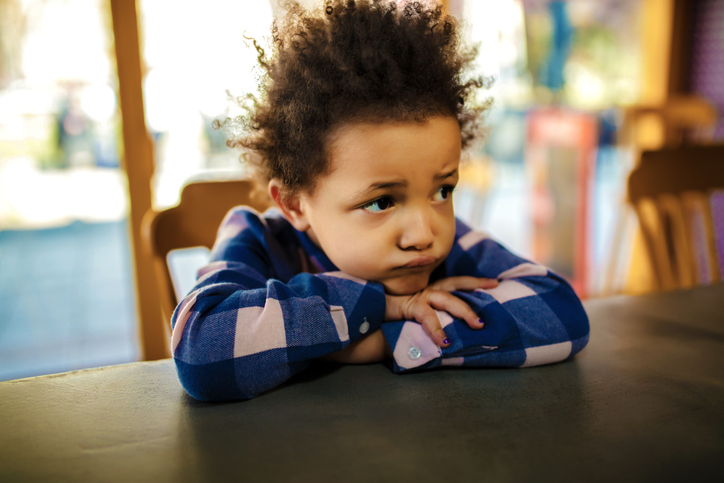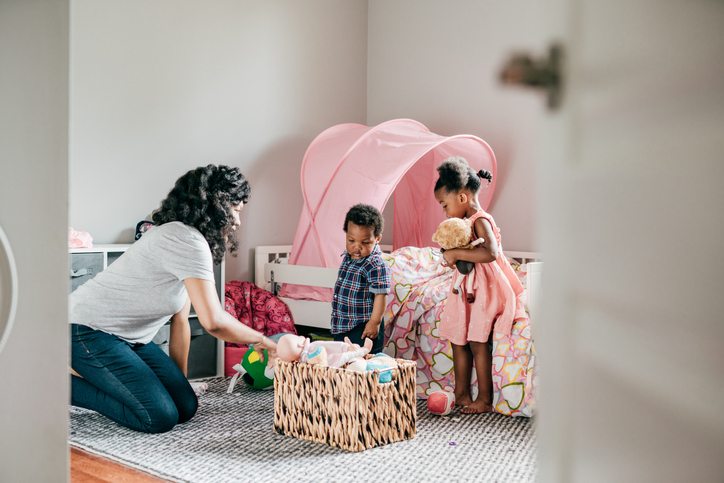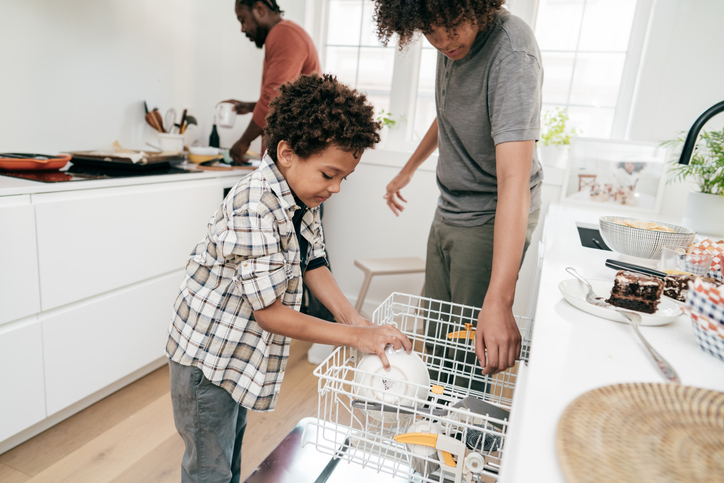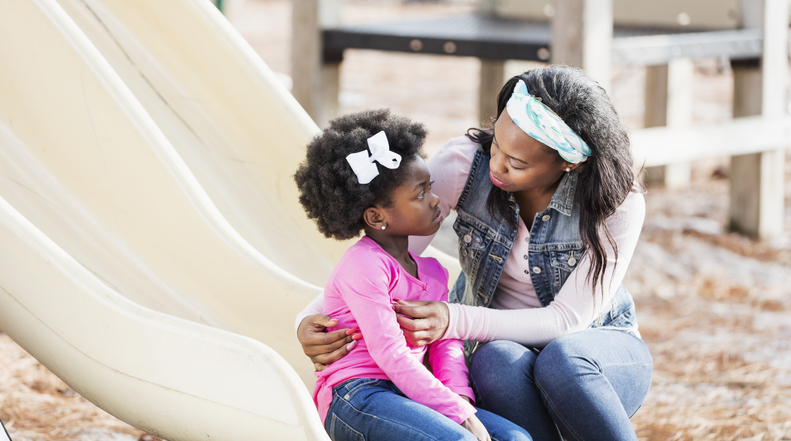Subtle And Blatant Signs Of Parental Favoritism
Signs Of Parental Favoritism
Share the post
Share this link via
Or copy link

Source: kali9 / Getty
The way parental favoritism manifests can vary drastically from one household to the next, but what remains the same are the scars such behavior can leave on the children involved.
“It doesn’t matter whether you’re the chosen child or not, the perception of unequal treatment has damaging effects for all siblings,” explained Dr. Karl Pillemer, Ph.D., director of the Cornell Institute for Translational Research on Aging and author of a study on parental favoritism published in the Journal of Marriage and Family, which found that preferential treatment was linked to middle-aged depression in both favored and unfavored children. “The less favored kids may have ill will toward their mother or preferred sibling, and being the favored child brings resentment from one’s siblings and the added weight of greater parental expectations.”
Parental favoritism, while often easily detected by the children and outside parties, is not always obvious to the offending parent. In many cases, the favoritism is not due to the parent loving one child more than another, but rather a matter of differences in personality.
“It can be very common for a parent to ‘like’ or ‘vibe better’ with one sibling more so than the others,” Michele Levin, family therapist and co-owner of Blueprint Mental Health, told Healthline. “A father who’s interested in sports will likely relate better to a child who’s also into sports, as opposed to a child who prefers the indoors and video games, for example,” Levin explained. “These dynamics can get very complicated.”
Of course, differences in personality don’t absolve a parent of their responsibility to make all of their children feel loved, accepted, and appreciated. The first step to putting a stop to parental favoritism or perceived favoritism is recognizing the signs. Here are several of them.
You don’t enforce rules in a uniform way
While parents would like to believe that they are fair when it comes to enforcement of rules in their homes, this is not always the case. Many parents have a habit of selectively enforcing rules, which can obviously be perceived as a form of favoritism.

Source: Georgijevic / Getty
You reward one child more
While it can be exhausting when you have multiple children, as a rule of thumb, you shouldn’t do something for one child that you would not be willing to do for another. While you may have a perfectly logical explanation, young children, especially, will not always be able to understand the “why” behind your actions.

Source: Viktorcvetkovic / Getty
You frequently side with one child over the other
It’s not uncommon for siblings to get into disagreements and look to their parents to settle a squabble. It’s important to be mindful of how you handle these situations and the frequency in which you side with one child as opposed to another. It can be helpful to remain neutral as often as possible.

Source: kate_sept2004 / Getty
You are less patient with one of your children
Children will try you and some have temperaments that will wear on your nerves more than others. This can cause you to appear less patient with one of your kids in comparison to the others. You may also find that what works for one child does not work for the other, leaving you feeling frustrated and losing your cool more often. To balance things out, have a few disciplinary and communication strategies in your back pocket that you can utilize during particularly challenging moments.

Source: SDI Productions / Getty
You’re a harsher disciplinarian depending on which child is in trouble
Some parents are infamous for being harder on one of their kids than the others. They often justify their double standards by using the gender or age of the children. To combat this, consider creating an age-appropriate ladder of consequences for each child that you are able to follow consistently. This can make you more sensitive to disciplinary disparities.

Source: Iconic / Getty
You’re always looking for reasons to leave one child at home
Obviously, it’s much easier to get around with one child than with multiple kids. You may even have one child who is better behaved in public. This can lead you to subconsciously look for excuses to leave one child at home. From a very young age, children will pick up on that feeling of being left behind and it can manifest itself in very harmful ways.

Source: kate_sept2004 / Getty
Not all of your children are expected to do chores
Some parents are infamous for demanding that their daughters do housework while allowing their sons to get off scot-free. This is often the result of subscribing to traditional gender roles and parents will argue that they’re simply preparing their daughters for life, but it is definitely a form of favoritism.
Similarly, forcing one kid to do more cleaning around the home because the other is involved in more extracurriculars is also unbalanced and can lead to harbored resentment.

Source: SDI Productions / Getty
You frequently complain about one child to the other
While it’s not uncommon for a parent to vent to their kids about their siblings from time to time, frequently complaining about one child to another is detrimental to both children. It can place the child who is doing the listening in an uncomfortable position while also creating a rift between siblings. At some point or another, those thoughts you expressed will get back to your other child.

Source: Patra Kongsirimongkolchai / EyeEm / Getty
You compare your kids to one another
It’s natural for parents to compare their kids from time to time, but the comparisons become unhealthy when they’re frequent and negative in nature. “Why can’t you be more like so and so?” are words that a parent should never utter to their child. If there’s a trait in one child that you’d like to instill in another, try positive narration.

Source: kali9 / Getty
You spend more time with one child
Some children are naturally independent and prefer to spend most of their time alone, but if you notice that you are intentionally choosing to spend more time with one of your children over the others, it may be time to re-evaluate some things.
-

Beauty Of 5: Meet Wakati, The Newest Line Catered Specifically To Women With 4C Hair
-

She Tried It: Inahsi Naturals Aloe Hibiscus Leave-In Conditioner & Detangler
-

She Tried It: Ivy Park Drip 2 and 2.2 Black Pack
-

‘Always Work On Your Next Move’—Kandi Burruss Talks Leaving ‘Housewives,’ Broadway Wins, And Her Mogul Mindset
-

Not Just An Influencer—An Influence: How 'Just Add Hot Sauce' Creator Alex Hill Serves Food & Her Community
-

'My Experience Shaped Everything'—Jimmy Akingbola Talks Wrapping ‘Bel-Air,’ Foster Care, And Transforming The Industry
-

'This Is Really Home For Me' — Jerome Baker Talks Signing With Cleveland Browns, Giving Back & Entrepreneurship
-

8 Famous Lesbian Women Who Were Married To Men





